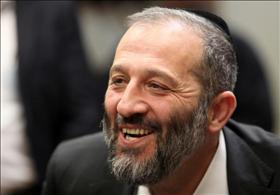A stormy day in relations between religion and state in Israel
Israel's clearance sale on religious freedom
Last Sunday was a stormy day in relations between religion and state in Israel. The ultra-Orthodox Shas party, headed by Economy Minister Aryeh Deri, recorded two victories over the national-religious Jewish Home party, led by Education Minister Naftali Bennett.
Shahar Ilan 19/07/2015 11:04
Tags: Shas · The Jewish Home · conversion

MK Aryeh Deri, Shas Party Leader
Last Sunday was a stormy day in relations between religion and state in Israel. The ultra-Orthodox Shas party, headed by Economy Minister Aryeh Deri, recorded two victories over the national-religious Jewish Home party, led by Education Minister Naftali Bennett.
The first involved control of the rabbinical courts, which are responsible for all divorces of Jews in Israel, which was transferred from the justice ministry, currently headed by a minister from the Jewish Home to the religious affairs ministry, controlled by Shas. The Shas bounty includes dozens of highly paid magistrate positions which can be handed out to relatives and supporters. These new appointments will increase the zeal of the courts and their discrimination against women.
The second Shas victory was the abolition of a planned reform in the process of conversions to Judaism. Some 350,000 Israelis are considered “religion-less” - they are immigrants from the former USSR who are descendants of Jews, or their partners. The Jewish Home Party places great store in the integration of these immigrants into Jewish society and is willing to ease religious requirements for the conversion process. The ultra-Orthodox, on the other hand, demand that every newcomer to Judaism undertake to lead a fully observant religious life. The previous government passed a reform, which the Jewish Home supports, that will set up tribunals for more lenient conversions. On Sunday, the government decided to cancel the reform before its implementation even began.
The significance of Black Sunday for the Jewish Home is clear: political issues and safeguarding the West Bank settlements are more important to its agenda than religious ones.
Anyone who opposes these decisions can hope that the government, which relies on a slim majority of 61 Knesset members out of 120, will fail to pass the budget and fall. If the amendments are approved, there is no doubt that the integration process of ultra-Orthodox men in military service and the workplace will be severely damaged.
Apparently no one should have been surprised by the two decisions. Both were agreed on two months ago in the coalition agreements of the new government. These agreements were actually a clearance sale of the church and state issue to the ultra-Orthodox parties. But most of the relevant articles of the agreement are yet to be implemented. This week marked the first round of decisions which amount to religious coercion on a massive scale, and it is directed primarily against the national-religious public.
The articles of the agreements that will meet even greater resistance among a large part of the public, and especially the secular, have not yet passed. They are waiting for budget approval in October. Then an even bigger fight will break out, among other things over a budget increase of hundreds of millions of shekels as stipends for married yeshiva students. This supplement will encourage them to remain in yeshivot and derail the process begun in recent years of integrating ultra-Orthodox into the workplace - a move vital to the future of the Israeli economy.
Another reform adopted by the previous government, which will now be scrapped, is education. The ultra-Orthodox school system barely teaches core subjects, such as mathematics and English, a fact that prevents these children from integrating into the labor market as adults and supporting themselves. The previous government, in which the secular Yesh Atid party was a central partner, passed a resolution that would have reduced the budgets of institutions that don’t teach the core curriculum, but did not implement it. The current government intends to cancel that resolution altogether.
But the issue that will undoubtedly generate the most controversy, as always, will be the exemption of ultra-Orthodox yeshiva students from military service. The previous government passed a law, initiated by Yesh Atid, that sets quotas for ultra-Orthodox conscription and imposes criminal sanctions on violators. The current government intends to pass an amendment that would enable violators to avoid sanctions.
Anyone who opposes these decisions can hope that the government, which relies on a slim majority of 61 Knesset members out of 120, will fail to pass the budget and fall. If the amendments are approved, there is no doubt that the integration process of ultra-Orthodox men in military service and the workplace will be severely damaged.
But the bigger question is where Israeli society is headed. Will the rapid growth of the ultra-Orthodox community continue by virtue of high birth rates (6.5 children per woman)? If so, Israel will emulate the Lebanese model of constant friction between various sections of society or the Turkish model of a strengthening of religious forces within the framework of the democratic regime.
But under economic pressures and the penetration of the Internet, ultra-Orthodox society is undergoing dramatic change, the direction of which is still hard to predict. If it causes some of the ultra-Orthodox to abandon strict religious life or makes some ultra-Orthodox integrate into the mainstream of Israeli society, the conflict between religion and democracy will be averted. Democracy could even emerge stronger.